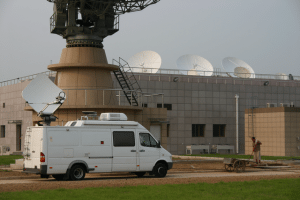Latest News
[Via Satellite 04-03-2014] Israel-based NovelSat is offering to provide broadcasters with free bandwidth, per se, through its newest product: FreeBand. According to NovelSat CEO Itzik Wulkan, the product enables live video over satellite contribution and distribution networks by using unique satellite transmission and band reuse technology. FreeBand is targeted toward broadcasters that lease additional bandwidth to deploy remote contribution units such as Digital Satellite Newsgathering (DSNG) teams and flyaways.
“Satellite bandwidth is roughly $200 to $400 per hour,” Wulkan told Via Satellite. “But with NovelSat FreeBand, which re-uses existing bandwidth from the broadcaster’s delivery network, there is no need to rent flyaway bandwidth and to deal with all the related administration. That’s the cost we can save.”
The cost of DSNG has risen because of the demand for higher video formats such as HD and Ultra HD (4K). Bandwidth is one of the larger costs for DSNG, and the demand for such services is on the rise in many parts of the globe. NovelSat’s FreeBand works by operating well below the noise threshold. This requires the antenna at the distribution hub to be larger than the remote antenna, but it allows for a greatly improved spectral efficiency capable of supporting higher video formats. The amount saved in operational costs can pay for the product in a matter of weeks.
“Our NovelSat FreeBand product makes it possible to simultaneously transmit HD and even 4K video and data in both directions,” said Wulkan. “So while bandwidth costs might rise with the demand for higher quality video, we can help to significantly mitigate those costs and in some cases neutralize them.”
HD and 4K aside, much of the new demand for DSNG comes from emerging markets. Often these venues for sports and other major events lack a strong terrestrial or cellular network. This makes satellite the primary—and sometimes only—means of broadcasting an event.
“The demand for sporting content alone in developing markets is astronomical, and just being there is going to drive [costs] up,” explained Brad Grady, senior analyst at NSR. “It’s not necessarily moving from SD to HD, it’s just physically being on location.”
Wulkan added that FreeBand also streamlines the logistics side of DSNG by removing the need to coordinate in unfamiliar cities.
“Assume you are a CNN journalist, just use the bandwidth that belongs to CNN for broadcasting, and you don’t need any coordination,” he said. “This is an additional benefit on top of the financial one. Many times the administrative costs are much worse than the direct financial burden.”
This could prove very useful in both connected and unconnected environments. Unfamiliar cities can present a broadcasting challenge regardless of whether or not the infrastructure to share content is available.
“If they are operating in an urban area — and we see this a lot with some of the SNG activity that happens in metropolitan London—the cell networks are very congested, and don’t necessarily have the capacity to support streaming video services in a reliable fashion,” said Grady.
By using a lower noise threshold, FreeBand is also reportedly more difficult to jam and makes content more difficult to steal. Nearby receiving terminals are unlikely to notice the use of FreeBand, and the data is encrypted to further prevent interception. According to Wulkan, NovelSat has received positive feedback from early customers who used the FreeBand system, and the company anticipates making more announcements regarding the product in the near future.
“We are going to be demonstrating it at the NAB show in Las Vegas,” said Wulcan. “Selling a ‘free product’ should really be quite easy.”
Get the latest Via Satellite news!
Subscribe Now